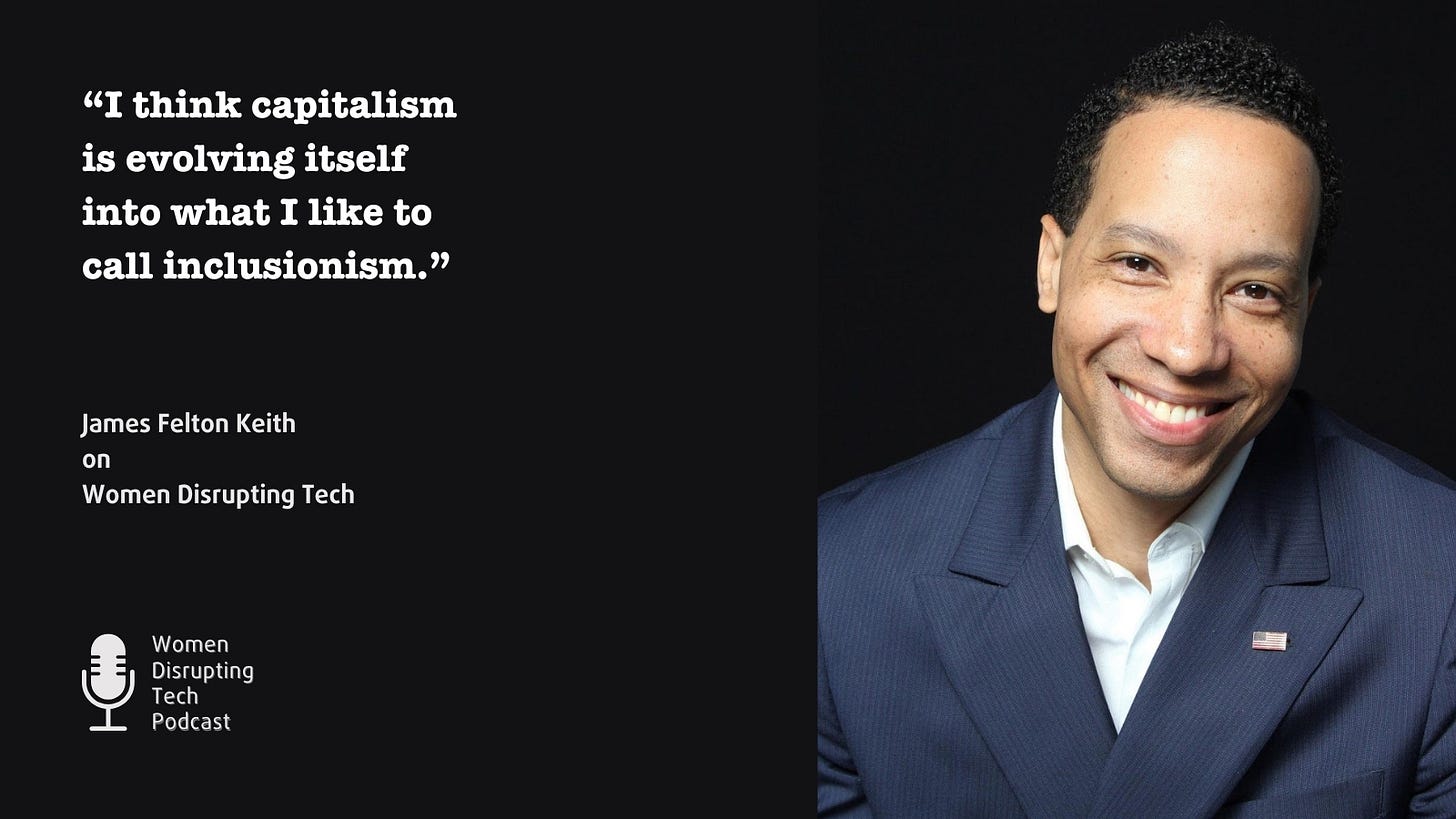If there’s ever been an episode I couldn’t wait to release, it’s this one.
Not only do we get a clear path to building inclusion into our business systems, but we also get a pricing mechanism to go with it.
In Episode 105 of Women Disrupting Tech, I talk to James Felton Keith, founder of Inclusion Score, a tool that helps companies measure how inclusive they really are.
We talk about:
💸 How exclusive workplaces end up paying more for insurance
🛠️ How the ISO 30415 rulebook helps fix broken workplace systems
📊 How companies can use DEI to grow, without leaving people behind
This episode is packed with fresh thinking and bold truths. Especially for founders, strategists, and leaders who want to build companies that are inclusive by design and resilient by default.
🎧 Hit play above to listen to Episode 105: Building Inclusion Into Capitalism now.
✨ Magic Moments
This conversation shifts how you see the system you're working in. Here are a few moments that really stand out:
💬 "I think capitalism is evolving itself into what I like to call inclusionism."
James reframes inclusion as the next phase of capitalism. Not a side campaign, but a core shift in how value is measured and distributed.
💬 "There is already a price on exclusion. The insurance industry is tracking it."
Workplace conflict, litigation, and discrimination are costing companies more than they realize. That cost is being priced into insurance premiums and rising fast.
💬 "I'm always doing the work for that 10-year-old boy in Detroit."
James grew up poor, Black, and queer, constantly questioning why society's systems weren't built for him. That experience fuels his mission today: to design systems that include everyone from the start, not as an afterthought.
🧠 The biggest surprise? Insurance companies are already tracking how inclusive your company is.
Did you know your company’s insurance premiums could be affected by its DEI practices?
“I think capitalism is evolving itself into what I like to call inclusionism” - James Felton Keith
Practical Takeaways for founders who want to build an inclusive company
For anyone building an inclusive business, especially in tech, here are three takeaways that matter:
You don't need more data; it's already being tracked.
Insurance companies and regulators are already tracking the cost of exclusion globally. You don't need to collect sensitive personal data to know where your company stands. The financial risk is visible and priced in.
DEI is becoming measurable and auditable.
Global standards like ISO 30415 help assess and improve your inclusion maturity across governance, HR, product delivery, and supply chains. This turns DEI into infrastructure.
Inclusion lowers your financial risk.
Companies that invest in inclusive systems are seeing lower insurance premiums because they're managing people risk better. Inclusion is now part of your financial infrastructure.
How inclusive is your business model — really?
If your goal is to build a company that lasts — one that attracts talent, earns trust, and scales sustainably — you can't afford to treat DEI as an afterthought. You need systems. You need a strategy.
And you need to know how the financial world is already rewarding inclusion. And penalizing the lack of it.
Click play above to hear more, or find episode 105 of Women Disrupting Tech on Apple, Spotify, YouTube or Amazon.
And if you’re interested in connecting with James, check out the links in the show notes.
Coming up on Women Disrupting Tech
Next week, we'll dive into the world of communication, training, coaching, confidential counselling, and crisis negotiation with Kirsten Heukels.
Here's a clip from our conversation that is particularly relevant when you want to put the right team together...
Stay tuned for more.
And until the next episode, stay curious and Keep Being Awesome!
Dirkjan
PS. You’ve made it all the way down here. So do yourself a favour and hit Subscribe.
You’ll help more women be heard, funded, and celebrated in tech.













Share this post